人教新目标版英语七年级上Unit 5 Do you have a soccer ball?Section A 2d-3c课件+嵌入音频(27张PPT)
文档属性
| 名称 | 人教新目标版英语七年级上Unit 5 Do you have a soccer ball?Section A 2d-3c课件+嵌入音频(27张PPT) | 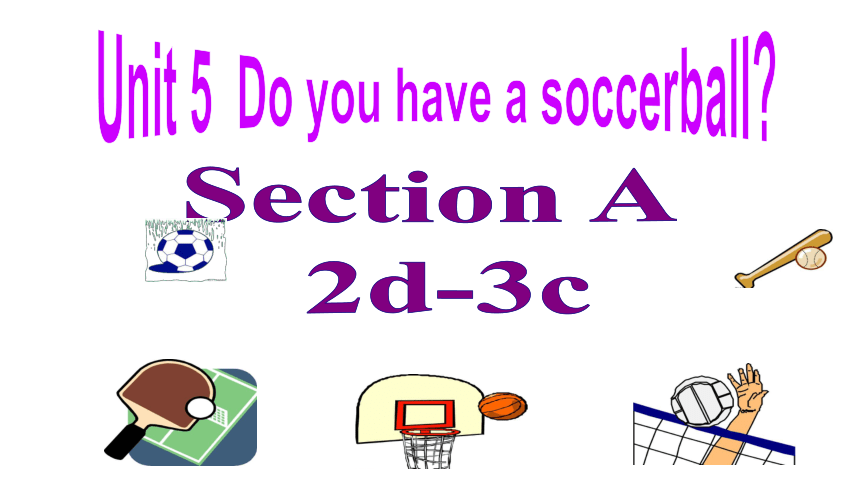 | |
| 格式 | zip | ||
| 文件大小 | 1.6MB | ||
| 资源类型 | 教案 | ||
| 版本资源 | 人教新目标(Go for it)版 | ||
| 科目 | 英语 | ||
| 更新时间 | 2021-12-29 21:52:21 | ||
图片预览

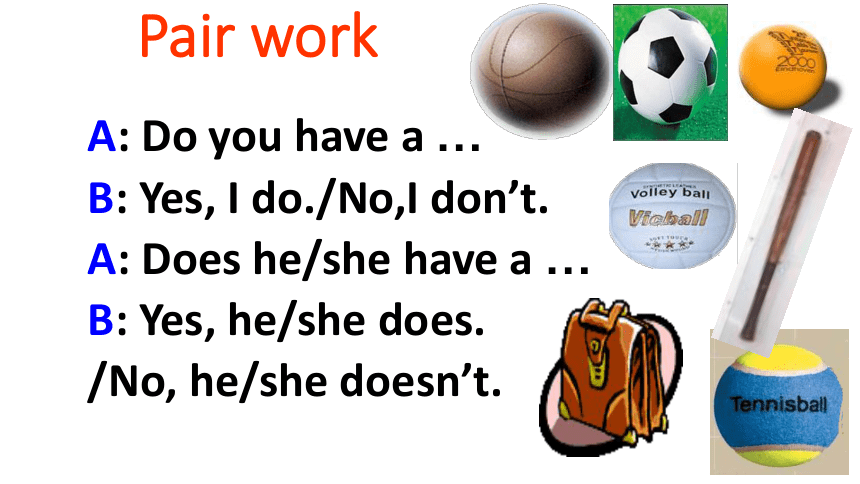
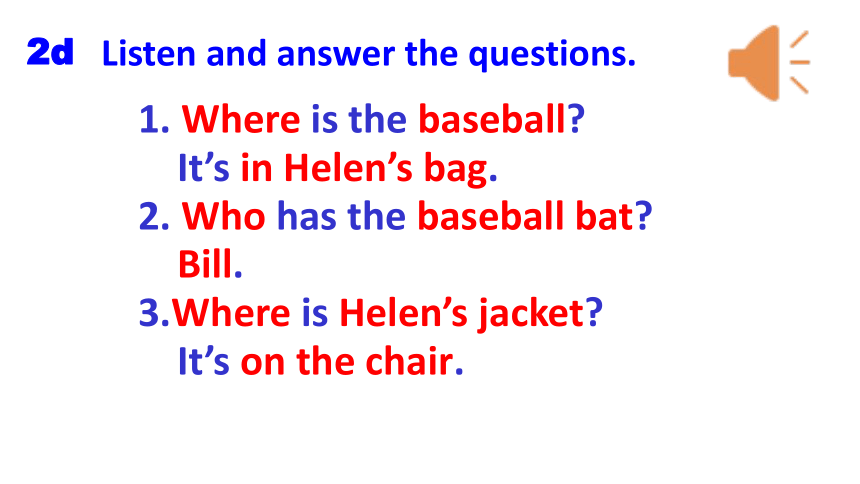
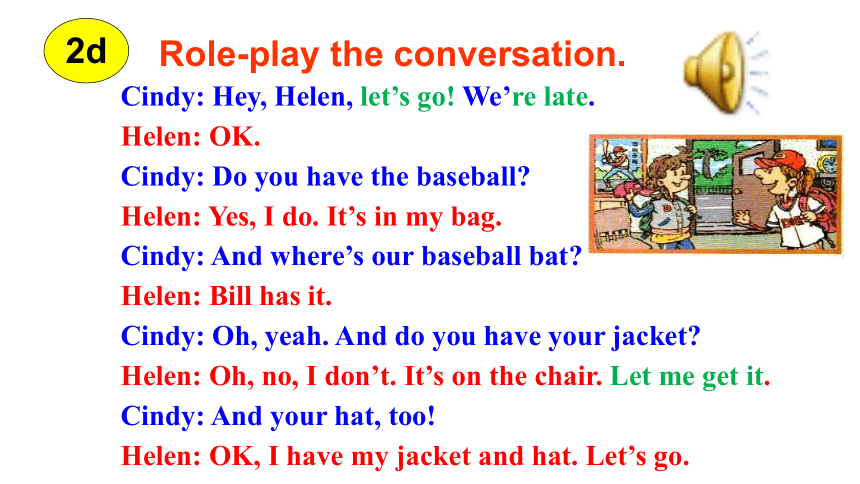
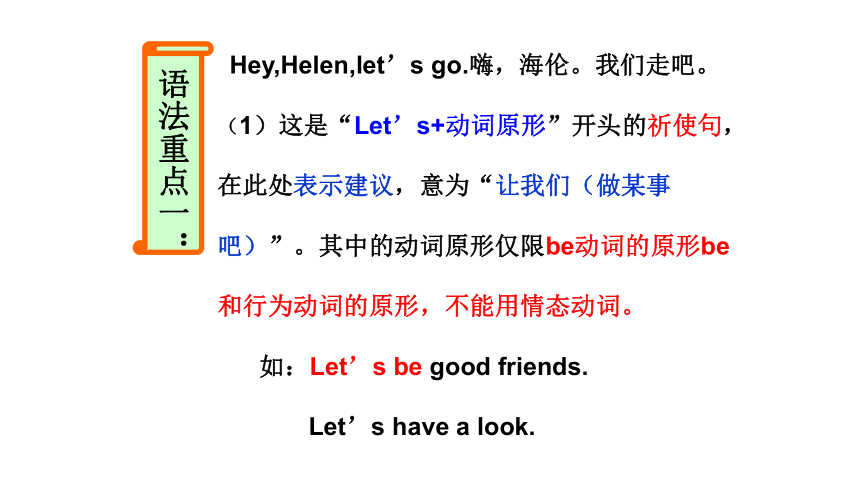
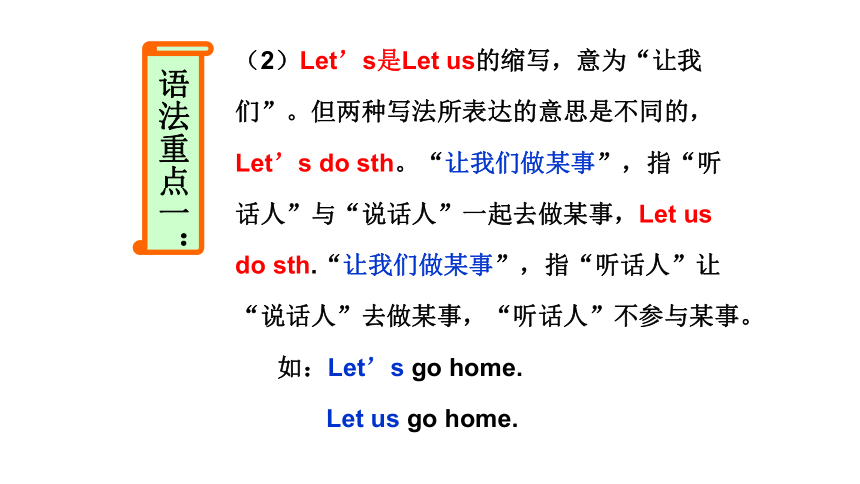
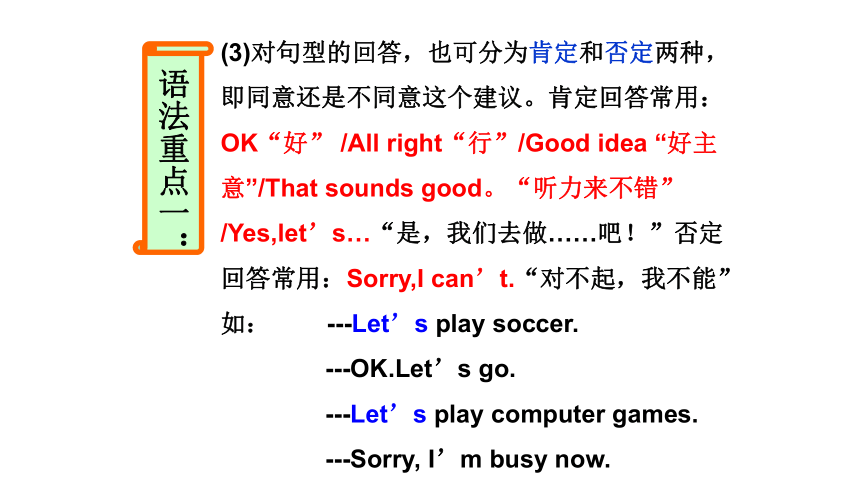

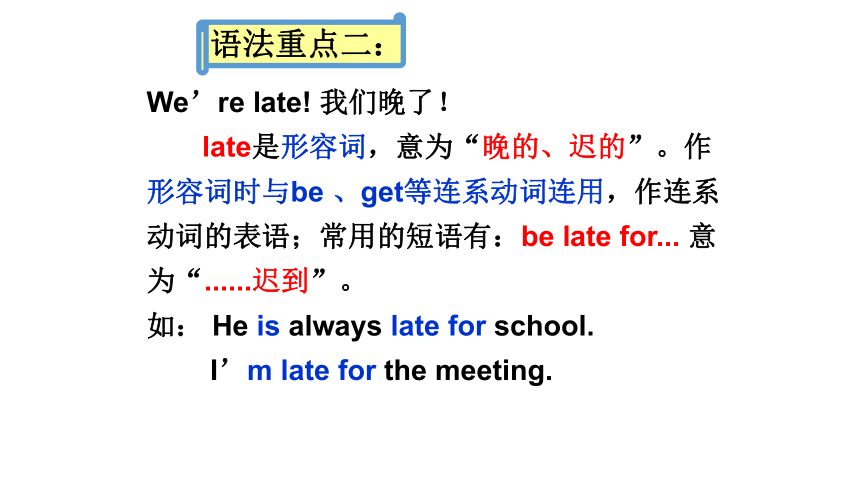
文档简介
(共27张PPT)
Section A
2d-3c
Unit 5 Do you have a soccerball
Pair work
A: Do you have a …
B: Yes, I do./No,I don’t.
A: Does he/she have a …
B: Yes, he/she does.
/No, he/she doesn’t.
1. Where is the baseball
It’s in Helen’s bag.
2. Who has the baseball bat
Bill.
3.Where is Helen’s jacket
It’s on the chair.
Listen and answer the questions.
2d
Cindy: Hey, Helen, let’s go! We’re late.
Helen: OK.
Cindy: Do you have the baseball
Helen: Yes, I do. It’s in my bag.
Cindy: And where’s our baseball bat
Helen: Bill has it.
Cindy: Oh, yeah. And do you have your jacket
Helen: Oh, no, I don’t. It’s on the chair. Let me get it.
Cindy: And your hat, too!
Helen: OK, I have my jacket and hat. Let’s go.
Role-play the conversation.
2d
语法重点一:
Hey,Helen,let’s go.嗨,海伦。我们走吧。
(1)这是“Let’s+动词原形”开头的祈使句,在此处表示建议,意为“让我们(做某事吧)”。其中的动词原形仅限be动词的原形be和行为动词的原形,不能用情态动词。
如:Let’s be good friends.
Let’s have a look.
语法重点一:
(2)Let’s是Let us的缩写,意为“让我们”。但两种写法所表达的意思是不同的,Let’s do sth。“让我们做某事”,指“听话人”与“说话人”一起去做某事,Let us do sth.“让我们做某事”,指“听话人”让“说话人”去做某事,“听话人”不参与某事。
如:Let’s go home.
Let us go home.
语法重点一:
(3)对句型的回答,也可分为肯定和否定两种,即同意还是不同意这个建议。肯定回答常用:OK“好” /All right“行”/Good idea “好主意”/That sounds good。“听力来不错” /Yes,let’s…“是,我们去做……吧!”否定回答常用:Sorry,I can’t.“对不起,我不能” 如: ---Let’s play soccer.
---OK.Let’s go.
---Let’s play computer games.
---Sorry, I’m busy now.
2. let sb. do sth.,表示 “让某人做某事”,其中,
sb.可由名词或代词宾格来充当,其后的动
词一定要用动词原形。如:
Let me do (do) it. 让我来做吧。
Let me help (help) you. 让我来帮你吧。
Let him get (get) the jacket.
让他拿来你的夹克。
语法重点一:
语法重点二:
We’re late! 我们晚了!
late是形容词,意为“晚的、迟的”。作形容词时与be 、get等连系动词连用,作连系动词的表语;常用的短语有:be late for... 意为“......迟到”。
如: He is always late for school.
I’m late for the meeting.
一、英语中的人称和数(在一般现在时态中)在英语句子中,谓语动词的形式要与句子主语的人称和数相对应。
1. 第一人称单数:I (我)
be → am, have → 原形have
e.g. I’m a student. 我是一个学生。
I have a volleyball. 我有一个排球。
2. 第一人称复数:we (我们)
be → are; have → 原形have
e.g. We’re good friends.
我们是好朋友。
We have two baseball bats.
我有两个棒球拍。
3. 第二人称单(复)数:you (你/你们)
be → are; have → 原形have
e.g. He is a doctor.
他是个医生。
You have three ping-pong pats.
你(们)有三只乒乓球拍。
4. 第三人称单数:he (他), she (她),it
(它),Ms Wu (吴女士),Mike (迈
克)等。
be → is; have → 第三人称单数形式has
e.g. Linda is in her parents’ room.
琳达在她父母的房间里。
Ms Miller has two daughters.
米勒女士有两个女儿。
第三人称复数:they (他们),Mike and Tom
(迈克和汤姆),his parents (他的父母亲),
two baseballs (两个棒球)等。
be → are; have → 原形have
e.g. Three basketballs are in the box.
在盒子里有三个篮球。
They have four volleyballs and two tennis balls.
他们有四个排球和二个网球。
智慧学习P 95 新知初探 I
人称代词(主格)第一人称 I we
第二人称 you you
第三人称(单) he she it
第三人称(复) they
Read Grammar Focus!
智慧学习P 95 新知初探 II
二、句型“Do you have… ” “表示你有……吗?”,用于询问物品的所属关系。这是实义动词的一般疑问句结构。
1. 当主语是第一/第二/第三人称复数时, 句型结构为:
Do you/they/we/… + 动词原形…?
不管用什么动词,其回答是固定的。
肯定回答:
Yes, I/we/they do.
否定回答:
No, I/we/they don’t.
e.g. — Do they like basketball
他们喜欢打篮球吗?
— Yes, they do. 是的,他们喜欢。
— No, they don’t. 不,他们不喜欢。
2. 当主语为第三人称单数时,句子结构改为:
Does + he / she / it … + 动词原形 + …?
肯定回答:Yes, he/she/it does.
否定回答:No, he/she/it doesn’t.
e.g. — Does Jane have a new book
简有一本新书吗?
— Yes, she does. 是的,她有。
— No, she doesn’t. 不,她没有。
I he they you
we she it Eric
3a
Write each word in the correct place in the chart.
do does
I
he
they
you
we
she
it
Eric
智慧学习P 96 While reading 5
(1) Do
(2) Does doesn't has
(3) Do have
(4) Do have don't
第一人称
第二人称
第三人称
单数
复数
单数
单数
复数
复数
I
we
you
you
they, boys
…
he, she, it
Eric,Bob…
do
does
1. A: _____ you have a baseball
B: Yes, I ____.
A: Great! I have a bat. Let’s play.
3b
Fill in the blanks with do or does. Then practice the conversations with your partner.
Do
do
第一(I)、二 (you)人称用do
Practice
3. A: ____ your friends have a basketball
B: Yes, they ____. They have two
basketballs.
A: Well, let’s play basketball.
B: That sounds good.
Do
do
第三人称复数(your friends, they)用do。
2. A: _____ John have a soccer ball
B: No, he ________.
A: _____ he have a ping-pong bat
B: Yes, he ______. I think he has
a ping-pong ball, too.
A: Hmm … let’s ask.
Does
doesn’t
Does
does
第三人称单数(John, he)用does
play basketball 意为“打篮球”,其中,play作动词,意为“玩;娱乐;参加(运动或比赛);打。 play soccer 踢足球 play cards 打牌
play volleyball 打排球
play tennis 打网球
play ping-pong 打乒乓球
play baseball 打棒球
play games 玩游戏
Explanation
不加冠词
2.play:弹奏,演奏.
play the piano 弹奏钢琴
play the guita 弹吉他
必须加定冠词the
2. That sounds good. 听起来不错。
sound在句中作系动词, 意为“听起来”,其后接形容词。第三人称单数形式为sounds。
e.g. The music sounds beautiful.
音乐听起来很美妙。
The idea sounds great.
这个主意听起来很棒。
s
Section A
2d-3c
Unit 5 Do you have a soccerball
Pair work
A: Do you have a …
B: Yes, I do./No,I don’t.
A: Does he/she have a …
B: Yes, he/she does.
/No, he/she doesn’t.
1. Where is the baseball
It’s in Helen’s bag.
2. Who has the baseball bat
Bill.
3.Where is Helen’s jacket
It’s on the chair.
Listen and answer the questions.
2d
Cindy: Hey, Helen, let’s go! We’re late.
Helen: OK.
Cindy: Do you have the baseball
Helen: Yes, I do. It’s in my bag.
Cindy: And where’s our baseball bat
Helen: Bill has it.
Cindy: Oh, yeah. And do you have your jacket
Helen: Oh, no, I don’t. It’s on the chair. Let me get it.
Cindy: And your hat, too!
Helen: OK, I have my jacket and hat. Let’s go.
Role-play the conversation.
2d
语法重点一:
Hey,Helen,let’s go.嗨,海伦。我们走吧。
(1)这是“Let’s+动词原形”开头的祈使句,在此处表示建议,意为“让我们(做某事吧)”。其中的动词原形仅限be动词的原形be和行为动词的原形,不能用情态动词。
如:Let’s be good friends.
Let’s have a look.
语法重点一:
(2)Let’s是Let us的缩写,意为“让我们”。但两种写法所表达的意思是不同的,Let’s do sth。“让我们做某事”,指“听话人”与“说话人”一起去做某事,Let us do sth.“让我们做某事”,指“听话人”让“说话人”去做某事,“听话人”不参与某事。
如:Let’s go home.
Let us go home.
语法重点一:
(3)对句型的回答,也可分为肯定和否定两种,即同意还是不同意这个建议。肯定回答常用:OK“好” /All right“行”/Good idea “好主意”/That sounds good。“听力来不错” /Yes,let’s…“是,我们去做……吧!”否定回答常用:Sorry,I can’t.“对不起,我不能” 如: ---Let’s play soccer.
---OK.Let’s go.
---Let’s play computer games.
---Sorry, I’m busy now.
2. let sb. do sth.,表示 “让某人做某事”,其中,
sb.可由名词或代词宾格来充当,其后的动
词一定要用动词原形。如:
Let me do (do) it. 让我来做吧。
Let me help (help) you. 让我来帮你吧。
Let him get (get) the jacket.
让他拿来你的夹克。
语法重点一:
语法重点二:
We’re late! 我们晚了!
late是形容词,意为“晚的、迟的”。作形容词时与be 、get等连系动词连用,作连系动词的表语;常用的短语有:be late for... 意为“......迟到”。
如: He is always late for school.
I’m late for the meeting.
一、英语中的人称和数(在一般现在时态中)在英语句子中,谓语动词的形式要与句子主语的人称和数相对应。
1. 第一人称单数:I (我)
be → am, have → 原形have
e.g. I’m a student. 我是一个学生。
I have a volleyball. 我有一个排球。
2. 第一人称复数:we (我们)
be → are; have → 原形have
e.g. We’re good friends.
我们是好朋友。
We have two baseball bats.
我有两个棒球拍。
3. 第二人称单(复)数:you (你/你们)
be → are; have → 原形have
e.g. He is a doctor.
他是个医生。
You have three ping-pong pats.
你(们)有三只乒乓球拍。
4. 第三人称单数:he (他), she (她),it
(它),Ms Wu (吴女士),Mike (迈
克)等。
be → is; have → 第三人称单数形式has
e.g. Linda is in her parents’ room.
琳达在她父母的房间里。
Ms Miller has two daughters.
米勒女士有两个女儿。
第三人称复数:they (他们),Mike and Tom
(迈克和汤姆),his parents (他的父母亲),
two baseballs (两个棒球)等。
be → are; have → 原形have
e.g. Three basketballs are in the box.
在盒子里有三个篮球。
They have four volleyballs and two tennis balls.
他们有四个排球和二个网球。
智慧学习P 95 新知初探 I
人称代词(主格)第一人称 I we
第二人称 you you
第三人称(单) he she it
第三人称(复) they
Read Grammar Focus!
智慧学习P 95 新知初探 II
二、句型“Do you have… ” “表示你有……吗?”,用于询问物品的所属关系。这是实义动词的一般疑问句结构。
1. 当主语是第一/第二/第三人称复数时, 句型结构为:
Do you/they/we/… + 动词原形…?
不管用什么动词,其回答是固定的。
肯定回答:
Yes, I/we/they do.
否定回答:
No, I/we/they don’t.
e.g. — Do they like basketball
他们喜欢打篮球吗?
— Yes, they do. 是的,他们喜欢。
— No, they don’t. 不,他们不喜欢。
2. 当主语为第三人称单数时,句子结构改为:
Does + he / she / it … + 动词原形 + …?
肯定回答:Yes, he/she/it does.
否定回答:No, he/she/it doesn’t.
e.g. — Does Jane have a new book
简有一本新书吗?
— Yes, she does. 是的,她有。
— No, she doesn’t. 不,她没有。
I he they you
we she it Eric
3a
Write each word in the correct place in the chart.
do does
I
he
they
you
we
she
it
Eric
智慧学习P 96 While reading 5
(1) Do
(2) Does doesn't has
(3) Do have
(4) Do have don't
第一人称
第二人称
第三人称
单数
复数
单数
单数
复数
复数
I
we
you
you
they, boys
…
he, she, it
Eric,Bob…
do
does
1. A: _____ you have a baseball
B: Yes, I ____.
A: Great! I have a bat. Let’s play.
3b
Fill in the blanks with do or does. Then practice the conversations with your partner.
Do
do
第一(I)、二 (you)人称用do
Practice
3. A: ____ your friends have a basketball
B: Yes, they ____. They have two
basketballs.
A: Well, let’s play basketball.
B: That sounds good.
Do
do
第三人称复数(your friends, they)用do。
2. A: _____ John have a soccer ball
B: No, he ________.
A: _____ he have a ping-pong bat
B: Yes, he ______. I think he has
a ping-pong ball, too.
A: Hmm … let’s ask.
Does
doesn’t
Does
does
第三人称单数(John, he)用does
play basketball 意为“打篮球”,其中,play作动词,意为“玩;娱乐;参加(运动或比赛);打。 play soccer 踢足球 play cards 打牌
play volleyball 打排球
play tennis 打网球
play ping-pong 打乒乓球
play baseball 打棒球
play games 玩游戏
Explanation
不加冠词
2.play:弹奏,演奏.
play the piano 弹奏钢琴
play the guita 弹吉他
必须加定冠词the
2. That sounds good. 听起来不错。
sound在句中作系动词, 意为“听起来”,其后接形容词。第三人称单数形式为sounds。
e.g. The music sounds beautiful.
音乐听起来很美妙。
The idea sounds great.
这个主意听起来很棒。
s
同课章节目录
- starters 预备篇(2012秋审查)
- Unit 1 Good morning !
- Unit 2 What’s this in English?
- Unit 3 What color is it ?
- Unit 1 My name's Gina.
- Section A
- Section B
- Unit 2 This is my sister.
- Section A
- Section B
- Unit 3 Is this your pencil?
- Section A
- Section B
- Unit 4 Where's my schoolbag?
- Section A
- Section B
- Unit 5 Do you have a soccer ball?
- Section A
- Section B
- Unit 6 Do you like bananas?
- Section A
- Section B
- Unit 7 How much are these socks?
- Section A
- Section B
- Unit 8 When is your birthday?
- Section A
- Section B
- Unit 9 My favorite subject is science.
- Section A
- Section B
